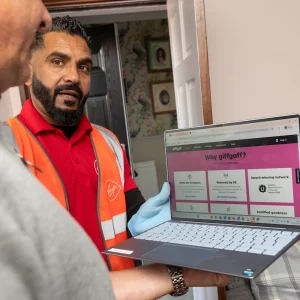Sponsored Links
UPDATE Fibrestream and BT in Spat over Quality of Stolen Copper Broadband Cable
Posted: 04th May, 2011 By: MarkJ


 BT has accused Guy Jarvis, the Director of Fibrestream (NextGenUs), a small community network specialist in next generation internet access services, of telling porky pies after it claimed that BT had replaced stolen copper cable at one of its telephone exchanges with an inferior substitute that would result in slower broadband internet access speeds.
BT has accused Guy Jarvis, the Director of Fibrestream (NextGenUs), a small community network specialist in next generation internet access services, of telling porky pies after it claimed that BT had replaced stolen copper cable at one of its telephone exchanges with an inferior substitute that would result in slower broadband internet access speeds.Fibrestream's Director, Guy Jarvis, said last week:
"Apparently some light-fingered rascals had the temerity to break into a certain rural telephone exchange sometime last night and proceed to make off with some 150 metres of prime copper scrap. Whilst this might seem, in the greater scheme of things, to be a temporary inconvenience to BT copper customers, there is a lasting penalty.
Older copper wires were 0.5mm^2 cross-sectional area – new wires are often 0.3mm^2 (saves money you see as copper is terribly expensive these days). Copper coated aluminium wire may be used as a replacement (cheaper).
Less cross-sectional area means higher resistance (impedance or both?) and good old Ally attenuates broadband frequencies more quickly than copper. Nett result? 1600 households and businesses now look destined to get crapper BT broadband tomorrow than they had yesterday."
"Apparently some light-fingered rascals had the temerity to break into a certain rural telephone exchange sometime last night and proceed to make off with some 150 metres of prime copper scrap. Whilst this might seem, in the greater scheme of things, to be a temporary inconvenience to BT copper customers, there is a lasting penalty.
Older copper wires were 0.5mm^2 cross-sectional area – new wires are often 0.3mm^2 (saves money you see as copper is terribly expensive these days). Copper coated aluminium wire may be used as a replacement (cheaper).
Less cross-sectional area means higher resistance (impedance or both?) and good old Ally attenuates broadband frequencies more quickly than copper. Nett result? 1600 households and businesses now look destined to get crapper BT broadband tomorrow than they had yesterday."
The Easter Holiday period meant that Fibrestreams complaint managed to slip under the proverbial radar of most tech journalists, at least until PCPro succeeded in scraping out a strong denial from BT today.
BT Spokesman said:
"We do not recognise Fibrestream’s claims. When cable is stolen or damaged our policy is to replace it with like for like, good quality cable."
"We do not recognise Fibrestream’s claims. When cable is stolen or damaged our policy is to replace it with like for like, good quality cable."
Meanwhile BT's latest cutting edge fibre optic cable wasn't even touched by the thieves because the scrap value of glass simply isn't worth the bother. Some thieves do occasionally steal fibre optic cable too, although it usually occurs while in the pursuit of copper. That or they really want to build a lot of fibre optic Christmas trees, we're simply not sure.
Fibrestream claims that the theft is just another example of why going the full FTTH fibre optic broadband rout is the best way forward, although BT would probably disagree. Apparently £770 million is the estimated cost, across all industries in the UK, for metal theft. It's unclear what proportion of this is shouldered by BT.
UPDATE 5th May 2011
The co-director of Fibrestream and an ex-BT engineer to boot, Simon Davison, has offered a more detailed rebuttal of BT's denial to ISPreview.co.uk today.
Simon Davison, Fibresteam's co-Director, explained:
"BT do use CW1308 grade telecommunications cable but due to the age of most of the line plant the copper diameter or conductive properties have changed in manufacturing over the years we have seen many instances where copper has been stolen by un-scrupulous individuals.
The conductive properties of different cables types induce loss between different grades of cable. Over the years BT has tried many different conductor types including paper wrapped aluminium conductors.
Regardless of the type or quality of a conductor if it is fractured and a Joint is required grease crimps are used to join one cable, this introduces impedance and attenuation on the line reducing it original capacity for high frequency transmission of the ADSL services
The joints are water tight but this may also lead to water ingress. Faults caused by moisture are called (HRDIS) high resistance disconnect. Symptoms of this type of fault are crackling on the line while the two calling parties are quite.
The only way of repairing a trunk cable to its original conductive properties is to replace the entire length of cable and remove the joint. Of course this is not cost efficient and customers will see a reduction in line quality as each repair is carried out.
It is unfortunate when any vandalism happens on any type of network, but fibre optics are more resilient to attack as loss introduced would rarely effect a customer."
"BT do use CW1308 grade telecommunications cable but due to the age of most of the line plant the copper diameter or conductive properties have changed in manufacturing over the years we have seen many instances where copper has been stolen by un-scrupulous individuals.
The conductive properties of different cables types induce loss between different grades of cable. Over the years BT has tried many different conductor types including paper wrapped aluminium conductors.
Regardless of the type or quality of a conductor if it is fractured and a Joint is required grease crimps are used to join one cable, this introduces impedance and attenuation on the line reducing it original capacity for high frequency transmission of the ADSL services
The joints are water tight but this may also lead to water ingress. Faults caused by moisture are called (HRDIS) high resistance disconnect. Symptoms of this type of fault are crackling on the line while the two calling parties are quite.
The only way of repairing a trunk cable to its original conductive properties is to replace the entire length of cable and remove the joint. Of course this is not cost efficient and customers will see a reduction in line quality as each repair is carried out.
It is unfortunate when any vandalism happens on any type of network, but fibre optics are more resilient to attack as loss introduced would rarely effect a customer."
As an ex-BT engineer Davison probably knows a thing or two about the incumbent's current practices.
Search ISP News
Search ISP Listings
Search ISP Reviews
Latest UK ISP News







Cheap BIG ISPs for 100Mbps+
150,000+ Customers | View More ISPs
Cheapest ISPs for 100Mbps+
Modest Availability | View More ISPs
Latest UK ISP News
Helpful ISP Guides and Tips
Sponsored Links
The Top 15 Category Tags
- FTTP (6916)
- BT (3917)
- Politics (3119)
- Business (2821)
- Openreach (2703)
- Building Digital UK (2537)
- Mobile Broadband (2527)
- Statistics (2161)
- FTTC (2153)
- 4G (2132)
- Virgin Media (2065)
- Ofcom Regulation (1801)
- 5G (1782)
- Fibre Optic (1616)
- Wireless Internet (1615)
Sponsored
Copyright © 1999 to Present - ISPreview.co.uk - All Rights Reserved - Terms , Privacy and Cookie Policy , Links , Website Rules





























